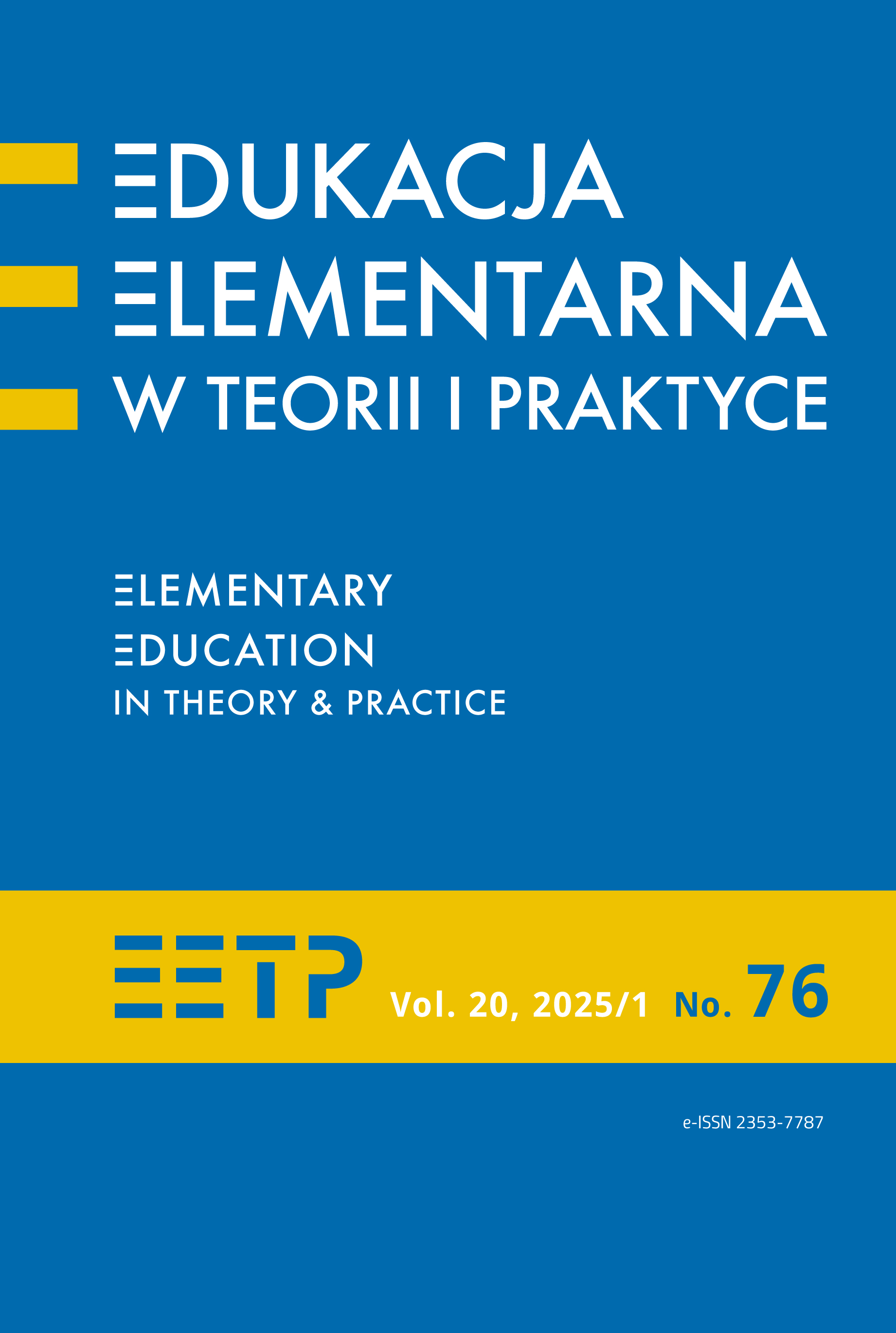Monitorowanie postępów dzieci w metodzie projektów
Abstrakt
Celem artykułu jest charakterystyka wybranych sposobów monitorowania postępów dziecka podczas pracy metodą projektów przez nauczyciela przedszkola a przez to rekonstrukcja ustalonych znaczeń i opisanie kierunku zmian praktyk społecznych.
Celem badań było zrozumienie i opisanie przestrzeni do oceniania i monitorowania postępów wychowanków w procesie uczenia się w przedszkolu podczas realizacji metody projektów. Perspektywę badawczą ujęto w pytaniach: W jaki sytuacjach, zadaniach nauczyciel podczas pracy metodą projektów może monitorować i oceniać postępy dziecka w procesie uczenia się? Przy pomocy jakich metod nauczyciel może monitorować postępy dzieci? Jaki zakres wiedzy, umiejętności i funkcjonowania wychowanka może być monitorowany przez nauczyciela w metodzie projektów?
Zrealizowany projekt badawczy mieści się w paradygmacie interpretatywnym, w perspektywie jakościowej. W ramach badań zastosowano podstawowe typy procedur gromadzenia danych jakościowych i dlatego w opracowaniu poddano materiał badawczy uzyskany w trakcie trwania projektów edukacyjnych w toku obserwacji uczestniczącej i analizy dokumentów (prac dzieci).
Na podstawie dokonanych analiz materiału badawczego wydobyto kategorie tworzące przestrzeń do monitorowania i oceniania procesu uczenia się dziecka z wykorzystaniem metody projektów. Pokazano działania edukacyjne, sytuacje, wytwory, które ułatwiają określenie i uwidaczniają dowody faktycznego uczenia się dziecka.
Bibliografia
Andrzejewska, J. (2013). Metoda projektów szansą intensyfikacji uczenia się uczniów z klas I–III. Rocznik Pedagogiczny, 5(41/2), 187–211.
Andrzejewska, J. (2019). Sytuacje edukacyjne w szkole zogniskowane na uczeniu się wychowanka. Roczniki Pedagogiczne, 11(47/2), 81–91. httpS://dx.doi.org/10.18290/rped.2019.11.2-7
Bałachowicz, J. (2017). Szkoła jako przestrzeń budowania przyszłości. W: J. Bałachowicz, A. Korwin-Szymanowska, E. Lewandowska i A. Witkowska-Tomaszewska, Zrozumieć uczenie się. Zmienić wczesną edukację (s. 11–95). Wydawnictwo Akademii Pedagogiki Specjalnej.
Bruner, J.S. (2006). Kultura edukacji (T. Brzostowska-Tereszkiewicz, tłum.). Towarzystwo Autorów i Wydawców Prac Naukowych „Universitas”.
Dylak, S. (2013). Architektura wiedzy w szkole. Difin.
Filipiak. E. (2009). Uczenie się w klasie szkolnej w perspektywie socjokulturowej. Forum Dydaktyczne, 5–6, 82–98.
Helm, J.H. i Katz, L.G. (2003). Mali badacze. Metoda projektu w edukacji elementarnej (E. Pulkowska, tłum.). Centralny Ośrodek Doskonalenia Nauczycieli, Polska Fundacja Dzieci i Młodzieży.
Maj, A. (2014). Metoda projektów we wczesnej edukacji szansą demokratyzacji przestrzeni edukacyjnej dziecka. W: K. Gawlicz, P. Rudnicki, M. Starnawski i T. Tokarz (red.), Demokracja i edukacja: dylematy, diagnozy, doświadczenia (s. 225–243). Wydawnictwo Naukowe Dolnośląskiej Szkoły Wyższej.
Maj, A. (2017a). Dialog dzieci i nauczycieli w żłobkach Reggio Emilia. Nauki o Wychowaniu. Studia Interdyscyplinarne, 5(2), 48–64. https://doi.org/10.18778/2450-4491.05.04
Maj, A. (2017b). Koncepcja stu języków dziecka w przedszkolach Reggio Emilia. O przełamaniu hegemonii języka werbalnego w dziecięcym procesie uczenia się. Problemy Wczesnej Edukacji, 36(1), 112–120.
Maszke, A.W. (2008). Metody i techniki badań pedagogicznych. Wydawnictwo Uniwersytetu Rzeszowskiego.
Palka, S. (2010). Podstawy metodologii badań w pedagogice. Gdańskie Wydawnictwo Psychologiczne.
Pintal, D. (2022). Ocenianie kształtujące. Od koncepcji do praktycznej realizacji w klasie zróżnicowanej. Ośrodek Rozwoju Edukacji.
Rybińska, A. i Kuszak, K. (2021), Współpraca dzieci w wieku przedszkolnym. Zmieniające się konteksty i perspektywy. Wydawnictwo Naukowe Uniwersytetu im. Adama Mickiewicza.
Siwicki, M. (2021). Nowe podwórka współczesnego dzieciństwa. Wydawnictwo Akademii Pedagogiki Specjalnej.
Sterna, D. (2006). Ocenianie kształtujące w praktyce. Centrum Edukacji Obywatelskiej.
Sterna, D. (2016). Uczę się uczyć. Ocenianie kształtujące w praktyce. Centrum Edukacji Obywatelskiej.
Tyluś, U. (2022). Ocenianie kształtujące w edukacji wczesnoszkolnej. W: A. Klim-Klimaszewska (red.), Wielowymiarowość edukacji XXI wieku. T. 1: Edukacja przedszkolna i wczesnoszkolna (s. 199–210). Wydawnictwo Naukowe IKRiBL.
Wiliam, D. (2013). Rola oceniania kształtującego w skutecznych środowiskach uczenia się. W: H. Dymaont, A. Isrance i F. Benavides (red.), Istota uczenia się. Wykorzystanie wyników badań w praktyce (s. 209–247). ABC a Wolters Kluwer Business.
Witkowska-Tomaszewska A. (2017). W stronę paradygmatu uczenia się – o transformacji świadomości edukacyjnej nauczycieli. W: J. Bałachowicz, A. Korwin-Szymanowska, E. Lewandowska i A. Witkowska-Tomaszewska, Zrozumieć uczenie się. Zmienić wczesną edukację (s. 97–140). Wydawnictwo Akademii Pedagogiki Specjalnej .
Zdybel, J. (2015). Metapoznanie – ukryty wymiar kompetencji uczenia się. W: J. Uszyńska- Jarmoc i M. Bilewicz (red.), Kompetencje kluczowe dzieci i młodzieży. Teoria i badania (s. 54– 70). Wydawnictwo Akademickie Żak.
Copyright (c) 2025 Edukacja Elementarna w Teorii i Praktyce

Utwór dostępny jest na licencji Creative Commons Uznanie autorstwa – Bez utworów zależnych 4.0 Międzynarodowe.
1. Autor zgłaszając swój artykuł oświadcza, że jest Autorem artykułu (zwanego dalej Utworem) i:
- przysługują mu wyłączne i nieograniczone prawa autorskie do Utworu,
- jest uprawniony/a do rozporządzania prawami autorskimi do Utworu.
Oświadcza, że nie narusza praw autorskich osób trzecich i praw prawnych.
Oświadcza, że nie występuje żaden konflikt interesów.
2. Udziela Uniwersytetowi Ignatianum w Krakowie nieodpłatnej, niewyłącznej, nieograniczonej terytorialnie licencji do korzystania z Utworu na następujących polach eksploatacji:
- utrwalania utworu w formie papierowej, a także na nośniku cyfrowym lub magnetycznym;
- zwielokrotnienia utworu dowolną techniką, bez ograniczenia ilości wydań i liczby egzemplarzy;
- rozpowszechniania utworu i jego zwielokrotnionych egzemplarzy na jakimkolwiek nośniku, w tym wprowadzenia do obrotu, sprzedaży, użyczenia, najmu;
- wprowadzenia utworu do pamięci komputera;
- rozpowszechniania utworu w sieciach informatycznych, w tym w sieci Internet;
- publicznego wykonania, wystawienia, wyświetlenia, odtworzenia oraz nadawania i reemitowania, a także publicznego udostępniania utworu w taki sposób, aby każdy mógł mieć do niego dostęp w miejscu i czasie przez siebie wybranym;
- w zakresie praw zależnych do Utworu, obejmujących w szczególności prawo do dokonania koniecznych zmian w Utworze, wynikających z opracowania redakcyjnego i metodycznego, a także do dokonania tłumaczenia Utworu na języki obce.
Udzielenie licencji następuje z chwilą przekazania Utworu na rzecz Uniwersytetowi Ignatianum w Krakowie. Uniwersytet Ignatianum w Krakowie jest uprawniony do udzielania dalszych sublicencji do Utworu, w zakresie udzielonego prawa. Licencja jest ograniczona czasowo i zostaje udzielona na okres 15 lat, licząc od daty jej udzielenia.
Wyraża się zgodę i zachęca autorów do publikacji ich tekstu w Internecie (np. w repozytorium instytucji lub na jej stronie internetowej) przed lub podczas procesu składania tekstu jako, że może to prowadzić do korzystnych wymian oraz wcześniejszego i większego cytowania opublikowanego tekstu (Patrz The Effect of Open Access). Zalecamy wykorzystanie dowolnego portalu stowarzyszeń badawczych z niżej wymienionych:




